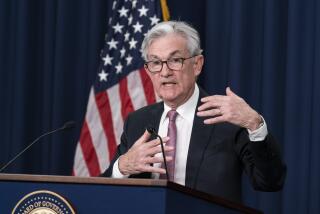China may need to slow the pace of economic growth
- Share via
Reporting from Beijing — Inflation in China soared in May to its highest level in 34 months, officials said Tuesday, as prices grew 5.5% from a year ago, bolstering expectations that the government will have to put the brakes on the world’s second largest economy.
The figures increase pressure on policymakers to raise interest rates for a third time this year and to continue tightening new bank lending.
Slower growth in China would be felt around the globe at a time when U.S. and European economies are still struggling. China is a major buyer for commodities, including grains, minerals and metals. Global copper prices have already been retreating on concerns that China’s infrastructure and property booms were beginning to wane.
China’s manufacturing activity, measured by the purchasing managers’ index, reached a nine-month low in May. National auto sales declined last month for the first time in two years. Soaring property prices in the country’s most desirable cities are heading back to earth. And some coastal exporters are strapped for credit. Small- and medium-sized enterprises are closing at a rate of one every 25 days in the southern city of Wenzhou because of reduced financing and higher operating costs, according to local reports.
“When inflation is up, costs of raw materials will increase,” said Feng Xianhai, sales manager for Wenzhou Jing Zi Garment Co, Ltd., adding that the lack of bank loans affects business too. “We’re under pressure. But there’s nothing we can do about it but try to survive.”
The desperate situation for some business owners underscores the tricky balancing act confronted by policymakers in Beijing.
Tighten too much and the economy could face a hard landing. Keep monetary policy too loose and rising inflation and asset bubbles could spell disaster.
“They’re at a crossroads,” said Dong Tao, an economist with Credit Suisse and one of several analysts to downgrade growth forecasts for China this year.
Tao said central planners may welcome a modest slowdown to put the country on more solid footing.
That’s because many economists believe China’s economy, which grew by 10.3% last year, has been pumped up by unsustainable lending. Between 2009 and 2010, the nation’s money supply grew by 50% to blunt the effects of the global recession.
But after two years, that torrent of easy money has led to domestic imbalances and higher financial risks.
Money poured into the property market, driving up home values and angering millions of ordinary Chinese who were quickly priced out of the market. State-owned enterprises became flush with cash, delaying China’s much-needed rebalancing toward a more vibrant private sector.
China’s inflation soared, straining the budgets of average Chinese to pay for basics like food, energy and housing.
“China’s economy isn’t stable. The price of pork and lamb has been going up so much that we’re barely making any money,” said Yang Xiaoguang, a lunch cart operator in central Beijing.
To seize control of the situation, the central government has tightened credit, raised interest rates and forced banks to hold more of their capital in reserve. Officials have also imposed tough rules in the property sector in hopes of squeezing speculators.
Those measures appear to have taken some of the froth out of the market. Average housing prices in an index of nine leading cities, including Beijing and Shanghai, fell about 5% in April from a year ago and could plunge as much as 20% from their peak in January in the coming months, said Rosealea Yao, a real estate analyst for GaveKal Dragonomics, a Beijing-based economic research firm.
In Hangzhou, one of the hottest property markets in the country last year, home sales have fallen by half, leaving thousands of unsold apartments on the market, said Cao Xudong of the China Index Academy, a national real estate research firm.
“Developers are facing serious pressure,” Cao said. “They’ve built a lot of property they can’t sell.”
To entice buyers, a developer in the northeastern city of Harbin has reportedly tried giving away home appliances, movie tickets and rice dumplings.
Part of the reason many Chinese were being driven to real estate was to protect their savings from being eroded by inflation. China’s one-year deposit rate, now at 3.25%, has been lower than the inflation rate for more than a year.
Nicole Liu and Benjamin Haas in the Times’ Beijing bureau contributed to this report.
More to Read
Inside the business of entertainment
The Wide Shot brings you news, analysis and insights on everything from streaming wars to production — and what it all means for the future.
You may occasionally receive promotional content from the Los Angeles Times.











